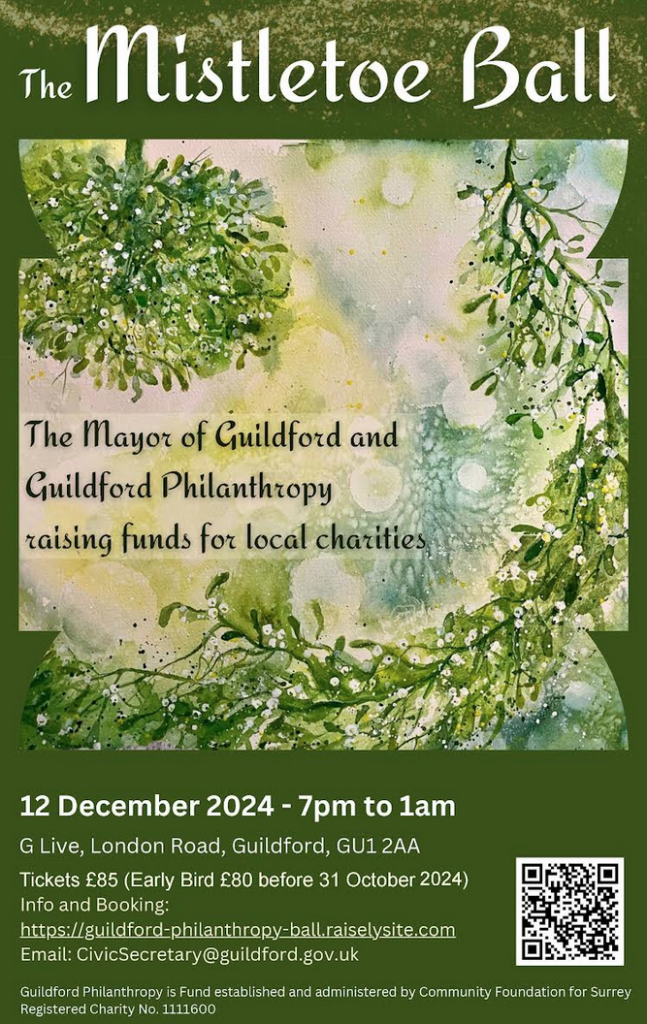 Abraham Lincoln
If given the truth, the people can be depended upon to meet any national crisis...
Abraham Lincoln
If given the truth, the people can be depended upon to meet any national crisis...
 Guildford news...
for Guildford people, brought to you by Guildford reporters - Guildford's own news service
Guildford news...
for Guildford people, brought to you by Guildford reporters - Guildford's own news service
Letter: Winning the Referendum Does Not Give the Brexiteers Carte Blanche
Published on: 17 Dec, 2016
Updated on: 17 Dec, 2016
In response to: Opinion: What Does the Richmond By-election Result Mean for Guildford?
Politics is the complex science of applying beliefs in a changing world. It is simplistic of Brexiteers to assert that winning the referendum gives them carte blanche to conduct the exit in their own way.
This is democracy: you have to go on living with the views of those who voted Remain. We have a right to have a say. We still want to protect Surrey from the loss of grants, workers, students and the introduction of taxes, passport problems and the French border. We aren’t going away.
I think it would be productive if local activists of all shades got together to discuss the tectonic shifts that have been exposed by the referendum, and I include not just the obvious issue of unleashed racism but of the deep class antagonism which is brewing, our poor grasp of federalism in both Europe and the UK itself, and what it means for both sides to continue working inside a democracy after a divisive vote.
Responses to Letter: Winning the Referendum Does Not Give the Brexiteers Carte Blanche
Leave a Comment Cancel replyPlease see our comments policy. All comments are moderated and may take time to appear. Full names, or at least initial and surname, must be given.

"Found any?" - "Nope, it all looks green to me!" (See Opinion: The Future is Congested, the Future is Grey)




Recent Articles
- Column: Guildford’s MP Writes – Championing the Needs of Guildford and Our Villages
- City Win at Last With Three Penalties in Cup Tie
- Letter: Development of Gosden Hill Could Be an Opportunity for Improvement
- Sara Sharif Trial Latest – Defence Says Sara’s Uncle ‘Facing Murder Count on Absolutely Nothing’
- Ash Level Crossing Row: GBC Rejects Cabinet Member’s Statement As ‘Factually Incorrect’
- Letter: What Will Be Done for Burpham Residents Now?
- Updated: County Council Cabinet Confirms Its Decision on London Road Scheme
- Postcode Lottery Police Funding – It ‘Cannot Be Fair’ Says Police Commissioner
- Heartbreak for City Again as Two Extra-time Goals Snatch Victory
- Letter: All Three Major National Parties Are Relaxed About Green Belt Giveaways


Recent Comments
- Warren Gill on Ash Level Crossing Row: GBC Rejects Cabinet Member’s Statement As ‘Factually Incorrect’
- Olly Azad on Heartbreak for City Again as Two Extra-time Goals Snatch Victory
- Brian Holt on Heartbreak for City Again as Two Extra-time Goals Snatch Victory
- Helen Skinner on Updated: County Council Cabinet Confirms Its Decision on London Road Scheme
- John Oliver on Updated: County Council Cabinet Confirms Its Decision on London Road Scheme
- John Ferns on Ash Level Crossing Row: GBC Rejects Cabinet Member’s Statement As ‘Factually Incorrect’
Search in Site
Media Gallery
Dragon Interview: Local Artist Leaves Her Mark At One of England’s Most Historic Buildings
January 21, 2023 / No Comment / Read MoreDragon Interview: Lib Dem Planning Chair: ‘Current Policy Doesn’t Work for Local People’
January 19, 2023 / No Comment / Read MoreA3 Tunnel in Guildford ‘Necessary’ for New Homes, Says Guildford’s MP
January 10, 2023 / No Comment / Read More‘Madness’ for London Road Scheme to Go Ahead Against ‘Huge Opposition’, Says SCC Leader
January 6, 2023 / No Comment / Read MoreCouncillor’s Son Starts Campaign for More Consultation on North Street Plan
December 30, 2022 / No Comment / Read MoreCounty Council Climbs Down Over London Road Works – Further ‘Engagement’ Period Announced
December 14, 2022 / No Comment / Read MoreDragon Interview: GBC Reaction to the Government’s Expected Decision to Relax Housing Targets
December 7, 2022 / No Comment / Read MoreHow Can Our Town Centre Businesses Recover? Watch the Shop Front Debate
May 18, 2020 / No Comment / Read More







C Stevens
December 17, 2016 at 3:04 pm
I always thought that, far from being a science, politics is the art of the possible. To understand what is possible, we need to have a few facts.
So could Sue Hackman let us have detail on “the loss of grants, workers, students and the introduction of taxes, passport problems and the French border”?
And I do mean facts, please, not something that is a rewrite of “Project Fear”, or some off the cuff remark by an EU Commission grandee seeing the end of the line.
David Pillinger
December 18, 2016 at 11:46 am
I suspect that Mr Steven’s request for information comes a little early as the Brexit negotiations have not yet happened. One can only draw conclusions from common sense and from the word on the street at the moment.
It goes without saying that when you leave a club, you no longer will receive the preferential treatment you used to. Imagine Scotland were splitting away from the United Kingdom. Would you sympathetically let them retain all the benefits of membership of the UK? I doubt it. Same goes for splitting away from the EU.
Sure, the art of the possible may get you to keep some of the benefits, but you will have to enter into immensely time wasting negotiation, which will require concessions or a cost, and in many cases you will fail.
C Stevens
December 18, 2016 at 7:23 pm
Mr Pillinger has taken my point which is that we don’t know what will or won’t happen. So to harp on about potential negative results just continues the fantasy of Cameron’s Third World War, Osborne’s emergency budget and the tales of crisis told by his chums Jamie Dimon of JP Morgan, Christine Lagarde of the IMF and, to his eternal shame I hope, Barack Obama.
We got by ok before there was the EEC and I suspect we’ll manage to do so again here in leafy Surrey. Nowhere else matters, after all.
David Pillinger
December 19, 2016 at 9:36 am
Just to remind Mr Stevens (who I presume is old enough to remember), before we joined the EEC, Britain was a basket-case economy, the laughing stock of the world, strike ridden and going nowhere. When I was a kid in the 1970s, my dad lost his job and never worked again, we struggled from day to day to pay the bills, there were three million unemployed and there was a brain drain.
Today, in part due to our access to a Single Market of 0.5 billion customers in the richest continent in the world, and in part to significant labour and tax reforms that unleashed business in an unfettered fashion into that market, we are the pride of the world and a centre for talent, innovation and business with virtually no unemployment.
I know I will not suffer the hardship of my parents in today’s Britain, and I know that people are far more secure today than they were in the bad old days.
John Perkins
December 18, 2016 at 2:00 pm
Those who wish to leave the EU have not asked for “carte blanche”; the problem is that those who oppose leaving want it reversed or stopped altogether – regardless of the democratic vote.
So it’s too early to give facts about what might be lost is it? When might be a good time to ask?
There is a clear difference between the issues of Scottish independence and the UK leaving the EU. The UK PAYS to be part of the EU and receives intangible benefits (though it seems it’s too early to say what they are), whereas Scotland receives money and other benefits from the UK. In simple financial terms independence would be costly for Scotland and its proponents were not able to convince a majority of Scots that it would be in their interest.
Sue Hackman
December 18, 2016 at 5:28 pm
Since Mr Stevens asks, let me attempt a reply:
We will lose all grants currently received from the EU Social Fund (our share of £1.8 in the SE), The EU Regional Development Grant which currently stands at £45.5m for the M3 local enterprise area, £88m of low-cost loans for homebuilding across Surrey and Hampshire, around £375,000 in student grants as part of the Erasmus programme (and as much again for students at the Royal Holloway) and income now worth over £10m a year to the university.
You can’t easily put a sum on the long-term cost to the university when students no longer choose the UK because EU grants don’t apply and because of the immigration curbs that have been pledged. You can’t yet put a sum on the trouble there will be to employ language assistants in secondary schools, exchange grants and learning programmes from which Surrey teachers have benefited.
Should the government slough off EU employment ‘bureaucracy’ such as the working time directive, the 31% of workers in Surrey who work part-time can look forward to a loss of equal rights with their full-time counter-parts, affecting their rates, their holiday pay and their conditions of service. Not Project fear but Project Experience speaking.
It’s not all about money, though. The referendum has made Surrey a less attractive place. Hate crime in the county rose by 15% in June and July following the referendum (and up 50% in the Reigate and Banstead area). We are less tolerant and more fearful of the stream of misery pouring into Europe from war zones.
Refugees are only doing what we would do for our families in the same situation: they are trying to survive. Don’t let campaign rhetoric harden our hearts against them. The recession has been bad, but there are no bombs falling here; we are not overrun with criminal foreigners; we don’t have our backs against the last wall. We can afford to open our hearts and our ears to build a kinder, more integrated Surrey after the divisions that have shaken Europe and our country.
Ben Paton
December 19, 2016 at 9:23 am
The refugee crisis is of course terrible. But let’s not forget that the Syrian refugee crisis was a preventable result. Part of the reason it was not prevented is that the EU does not have a foreign policy. Europe’s greatest country, Germany, has been in a pacifist pother ever since Hitler and the smaller states tend to vote for inactivity.
As for the money merry go round, there’s no reason why taking back responsibility from the EU for spending our own taxes will be any worse than the current situation.
John Perkins
December 19, 2016 at 1:17 pm
Perhaps I’m a little confused, but I don’t see what the refugee crisis has to do with whether or not the UK is a part of the EU. Are we to believe that members of the EU are somehow kinder than non-members?
C Stevens
December 19, 2016 at 6:37 pm
In response to Mrs Hackman, I don’t wish to have an NHS style debate, but it does occur to me that at least some of the grant and social fund money must come from the UK in the first place.
The £88m in low cost loans for housing association properties seems to come (in part at least) from the European Investment Bank. Their website says they advance money to countries which are not EU members, so all is not lost.
The Erasmus funding loss does seem a shame but I imagine there’ll be a solution.
When you get to an estimate of an annual loss of £10m to the university I do begin to wonder, but accept that you have info that I don’t.
I can’t see why relationships and exchange programmes should break down in the way that is feared. Surely individual educational institutions can make individual arrangements? People used to do that in the bad old days.
I thought that as a part of the divorce, EU regulations such as the working time directive would be given effect in English law. If they’re worth having, that is.
The idea of hate crime is sad. But I’m something of an old cynic and I feel we live in a society going through a period of self-flagellation. If you give people the opportunity to describe themselves as victims of hate crime they may well do so. What might have been shrugged off last week is now a matter for the police.
Refugees have terrible lives. But there are also people who come here with the intention, as far as I can tell, of abusing our hospitality: in some cases setting up people trafficking networks. That we cannot have. I don’t know who it was who said that society is only held together by a coat of varnish, but I believe it to be true. It doesn’t take much for the varnish to start to crack.
On a more positive note I think we should remember that the UK has traded and exchanged with EU countries for many years. Somehow we managed – even on our old blue passports – to travel extensively in Europe. We have to be careful not to become a little hysterical and imagine we’ll be shut out. We won’t.
RWL Davies
December 19, 2016 at 8:41 am
Had the “Club” governing body, dominated by unelected officials and a single senior member, been amenable to addressing, instead of ignoring, the sensible rule changes requested by one of its most senior members then there wouldn’t have been a “resignation”.
Continuing its introverted intransigence the “Club” governing body now engages in petty “unfriending” posturing and railing about “punishing” a member for resigning while singularly failing to deal with its own many and varied internal crises.
Without major reform, for which the governing body has neither the will nor the appetite, the “Club” is in irreversible decline, as shown by the positions taken by an increasing number of members.
The UK’s resignation is appropriate and timely.
John Perkins
December 19, 2016 at 12:50 pm
All of these “grants” are easily replaceable by national funding. But why should we subsidise property developers and universities anyway? There are businesses just the same as car manufacturers and coal mines were in the 1970s.
I don’t recall seeing zero-hours contracts until recently, so they must be allowed under EU employment law. Those having such contracts forced upon them must feel very protected indeed.
David Pillinger
December 28, 2016 at 11:23 am
I have been a finance director in Europe and I can assure you that zero hour contracts are a UK invention. On that basis, shall we pull out of the UK?